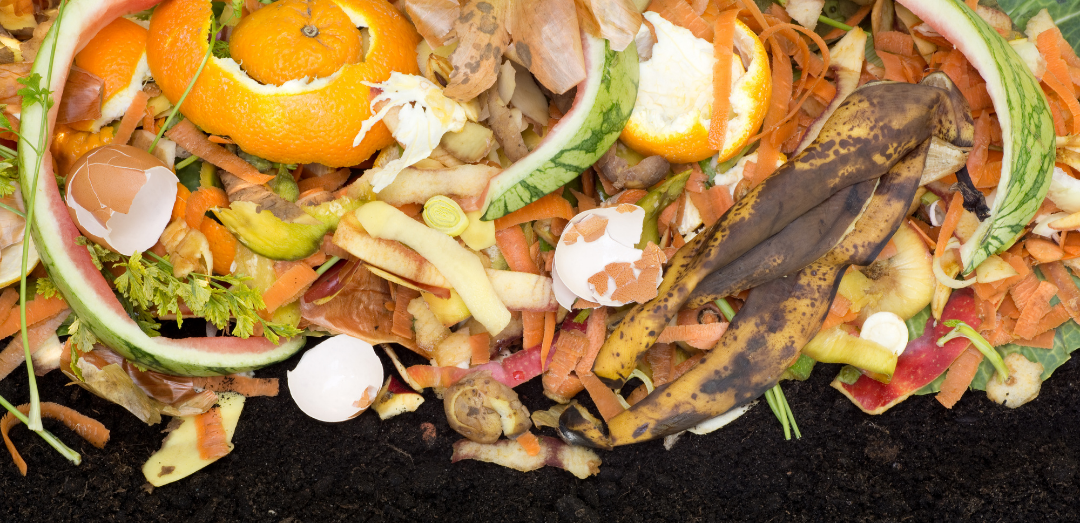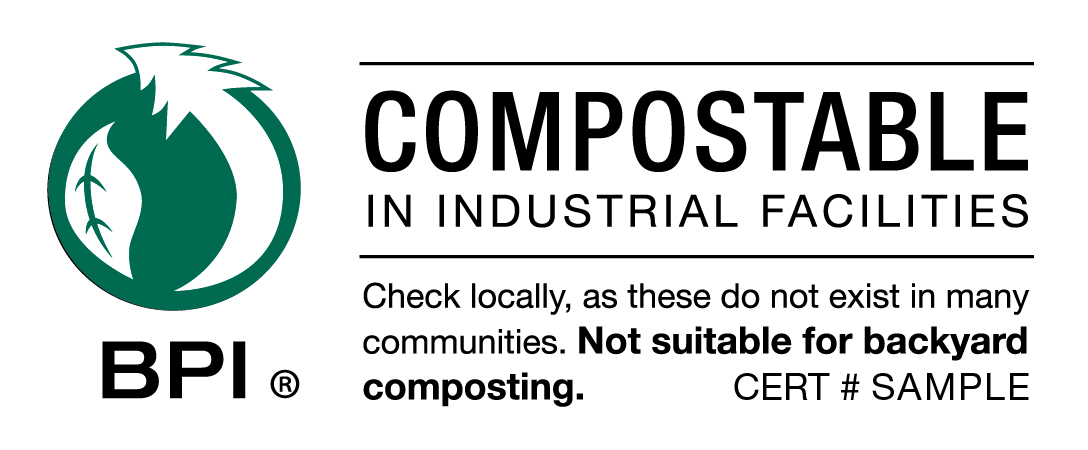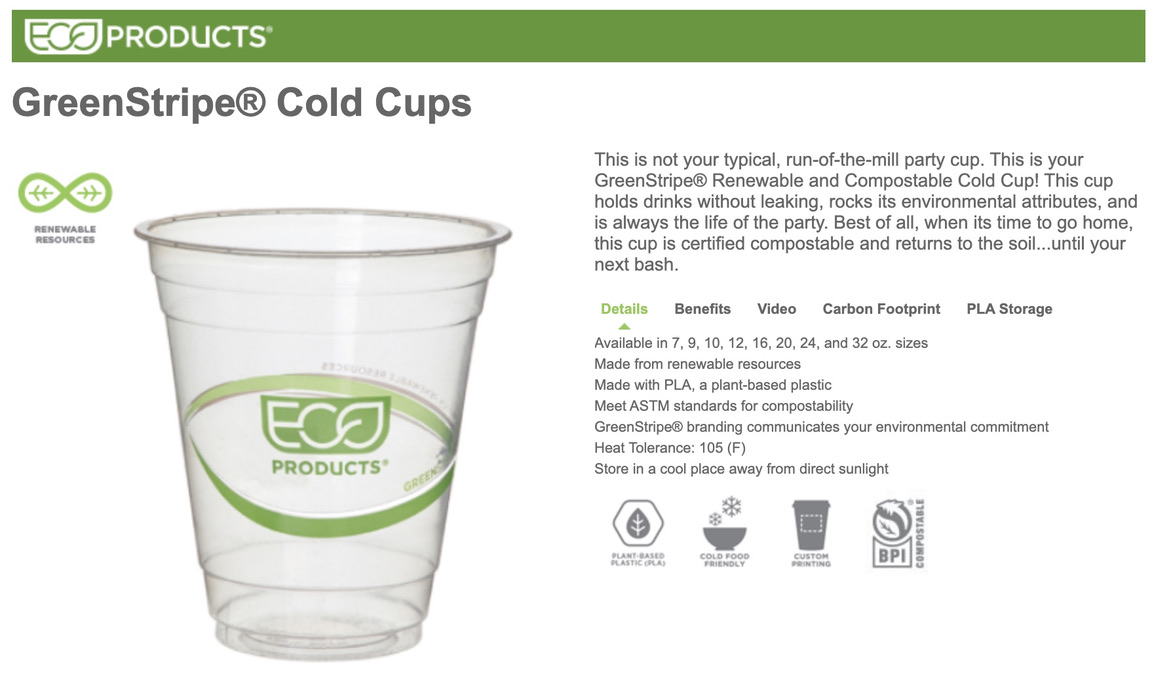
Before we get started, let’s avoid some confusion by explaining the following key terms. Once you understand the difference between them, you’ll have a much easier time learning about the topic in this blog.
- BPI certification: While BPI stands for Biodegradable Products Institute, BPI certification ensures the materials in the certified product are compostable.
- Biodegradable: A product or material that is naturally broken down by natural microorganisms
- Compostable: The product or material can be broken down by active composting methods over 90 days
- PLAs: Polylactic acid
- PFAs: Perfluoroalkyl and poly-fluoroalkyl substances
Now that you know what these terms mean, let's learn how BPI works to keep dangerous chemicals out of our products and what they’re doing to solve the global waste crisis.
BPI Certification keeps chemicals out of our bodies
The BPI Certification is a North American certification highly regarded worldwide to improve product quality, enhance health and safety, strengthen market access and trade, and build consumer confidence.
“Biodegradable plastics” entered the marketplace starting in the late 1980s. Before the onset of testing and certification standards, manufacturers took advantage of the lack of oversight, claiming products were biodegradable when, in fact, they did not degrade as advertised. It wasn’t until 2002, however, that ASTM developed tests and set specifications regarding biodegradable products. The ASTM D6400 and ASTM D6868 tests were designed to scientifically prove whether material is genuinely biodegradable, protecting consumers and holding companies responsible. The European Standard EN 13432 and the Australian norm AS4726 provide similar regional guidance on biodegradable standards.
Is there a difference between biodegradable and compostable?
The short answer is yes. As previously stated, a biodegradable product safely breaks down as microorganisms consume and process the material into organic waste. That’s a big reason why bacteria, fungi, and algae are so important. This process can take years to occur and can leave toxic substances such as metal residue.
On the other hand, compostable means a material can be broken down in a composting environment, usually within 90 days or so. The resulting product? Instead of potentially toxic substances, compostable products only leave behind small amounts of CO2, water, biomass, and humus, a soil amendment that helps your garden grow. Humus is full of nutrients and great for promoting the growth of trees and plants.
For more information on the differences between biodegradable and compostable materials, read this blog from Nature’s Path by clicking here.
Corn-based plastics are replacing petroleum plastics
PLA seeks to replace oil-based plastics. Instead of relying on non-renewables to produce and manufacture plastics, some companies use PLA to produce compostable bioplastic derived from plant sugars. Crops from corn to sugar cane can be processed to create plastics. Not only are these plastics safer to use, but they’re also compostable. It’s a similar initiative to rubber made from trees instead of petroleum or natural gas.
Corn-based PLAs are milled to extract glucose. Glucose is then fermented to produce lactic acid. The foodservice packaging company, Vegware, describes this chemical process that transforms the lactic acid into a polymer, which can be made into pellets, known in the industry as resin. These resins in pellet form, similar to synthetic polymers made from petroleum, can be shaped in myriad ways for compostable applications.
PFAs impact on the human body
The EPA refers to studies indicating that PFAs can cause reproductive and developmental, liver and kidney, and immunological effects in laboratory animals. It’s not just limited to lab tests, either. Studies show that PFAs can impact humans in all sorts of ways, including but not limited to:
- Low infant birth weights
- Added stress on our immune systems
- Cancers
- Thyroid hormone disruption
The compostable logo
The Institute established The Compostable Logo so that buyers could have confidence in the claims promoted. The BPI Certification Mark indicates the end-of-life opportunity for a compostable product.

Look for this logo in everyday products.
Why does a BPI certification matter?
The BPI certification mark specifies that each product has passed rigorous testing and verification of compostable claims. By only choosing BPI-certified products, consumers can trust that the items they are using do not contain PFAs.

In Memphis, Atlas Organics is a commercial composting organization that accepts only BPI-Certified products in their food waste. The Compost Fairy, also based in Memphis, focuses on education and Zero Waste event consulting.
If you plan an event and want to steer clear of these chemicals, look for BPI-certified compostable dining ware. Memphis' Caravan Supply Company partners with World Centric who only manufactures compostable food service and packaging products. Easily find BPI-certified Eco-Products from their website or Amazon.
Vegware US and GreenPaperProducts are other trustworthy sites that have BPI-certified paper products. Other Memphis restaurant suppliers like Lit Supply Company and Restaurant Depot may have certified compostables as SKU items at different locations. If they don’t, ask them to carry these SKUs at their Memphis stores.
Let’s go Green.

